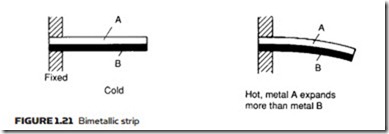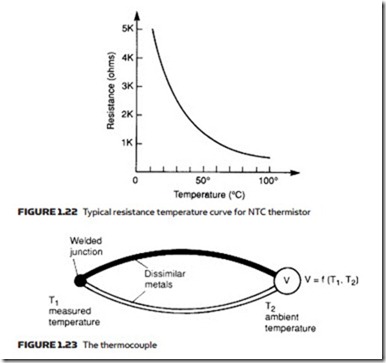There are four basic ways of measuring temperature based on temperature- dependent physical properties.
Expansion of a substance with temperature can be used to produce a change in volume, length or pressure. This is probably the most common type of temperature measurement in the form of mercury or alcohol-in-glass thermometers. A variation is the bimetallic strip shown in Figure 1.21, where two dissimilar metals have different coefficients of expansion which cause the strip to bend according to the temperature. This technique is the basis of most on/off thermo- stats used for temperature control or alarm annunciation. A bimetallic spiral can be used to construct an indicating thermometer.
Electrical resistance changes with temperature. A platinum wire with resis- tance 100 ohms at 0 °C will have a resistance of 138.5 ohms at 100 °C. Tempera- ture sensors based on this principle are known as RTDs (for resistance temperature detector) or PT100 sensors (from PT, for platinum, and 100 for 100 ohms at 0 °C). Semiconductor devices called thermistors have more dramatic changes, the char-
acteristics of a typical device being shown in Figure 1.22. The response, however, is non-linear which makes thermistors more suitable for alarm/control application than temperature indication.
Thermocouples, the principle of which is shown in Figure 1.23, use the small difference in contact potentials between different metals to give a voltage which depends on the temperature difference between the measurement and reference points. Although widely used in process control, the technique is rarely encountered in pneumatic and hydraulic systems.
The final method, called pyrometry, uses the change in radiated energy with temperature. As this has a minimum temperature measurement of about 400 °C, it is totally unsuitable for the systems we shall be discussing.

